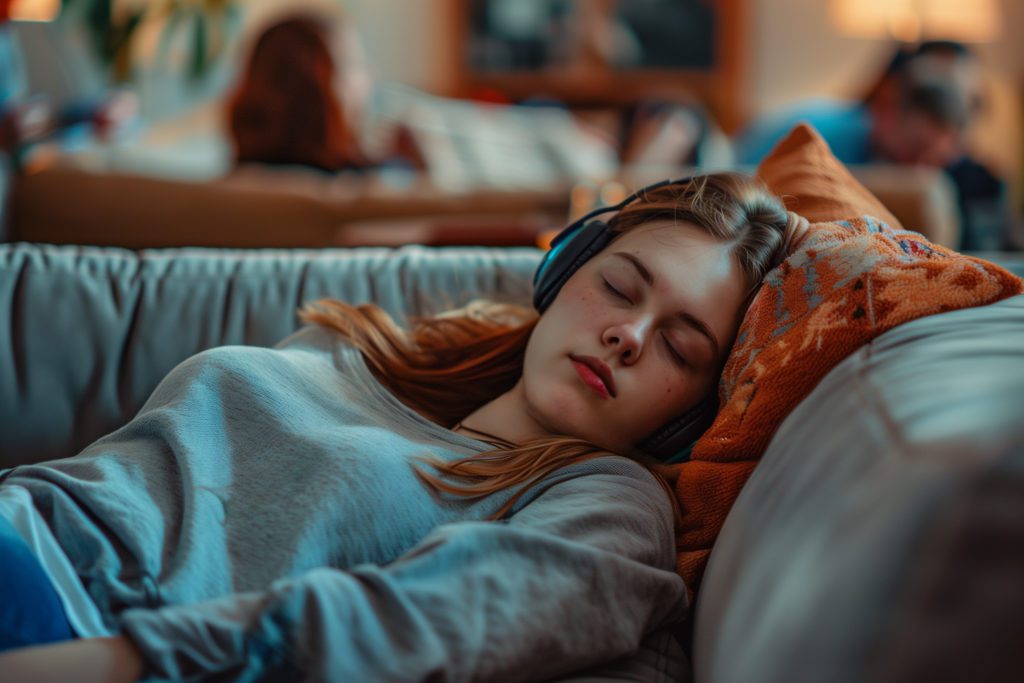
Sleep and Reaction Times: How Your Nights Affect Your Days
Is sleep deprivation making you more impulsive? Unpack how missing your nightly rest affects your decisions and reactions, leading to riskier behaviors.

A good night’s sleep may just be your best decision yet
Imagine carrying hot coffee through a bustling café, barely awake. You stumble slightly, the coffee sloshes over the brim, nearly scalding you—it’s a near miss that could’ve been painful (and messy!). Accidents happen, but such close calls are often the result of skimping on sleep.
This article explores how lacking sufficient rest fundamentally dulls your reflexes and muddles your decision-making. We'll look at the deeper effects of sleep deprivation that go beyond just feeling groggy, impacting everything from your morning coffee run to critical safety decisions.
Sleep: your brain’s essential tune-up
Think of a good night’s sleep as essential maintenance for your brain. This is particularly true for the parts that handle everything from your mood swings to your snap decisions. In a nutshell, sleep gives your mind the downtime it needs to regulate emotions and fine-tune your decision-making skills.
Central to this nightly reboot is the prefrontal cortex—the CEO of your brain, responsible for planning, problem-solving, and controlling impulses. Skimp on sleep, and you'll find this executive starts slacking, struggling to keep emotional reactions in check, which can lead to more impulsive and less thoughtful decisions.
Then there’s the memory consolidation process, crucial for learning and adapting new skills. Without enough sleep, your brain’s ability to absorb and retain information gets as foggy as your mind feels after pulling an all-nighter.
So, if you want to keep your reactions sharp and your emotions in tune, don’t skimp on sleep. Consider it non-negotiable brain maintenance that keeps you running smoothly, no matter what the day throws at you.
Why tired brains make rash decisions
Sleep deprivation significantly disrupts your brain’s ability to keep your impulses and emotions in check. This is because, as we’ve established, a lack of sleep primarily impacts the prefrontal cortex, the brain's executive command center, and its interaction with the amygdala, the seat of emotional processing.
When you're well-rested, the prefrontal cortex effectively regulates responses triggered by the amygdala, promoting balanced emotional reactions and thoughtful decision-making. However, without enough sleep, this regulatory mechanism falters. The amygdala reacts more intensely to stimuli, and without the usual oversight from the prefrontal cortex, this leads to heightened impulsivity and emotional volatility.
Research highlights the gravity of this disruption. For instance, a study found that even moderate sleep deprivation significantly increases impulsive behavior. Participants operating on insufficient sleep were more likely to engage in risk-taking activities, showing a clear decline in their decision-making abilities.
Another study illustrates that sleep-deprived individuals have a higher activation in brain regions associated with reward seeking, further compounding the risk of impulsive decisions. This neurobiological change explains why, when tired, people are more likely to pursue high-risk, high-reward options, despite the potential negative consequences.
This evidence paints a clear picture: sleep is not just a restorative need but a key player in maintaining emotional balance and decision-making acuity. Skipping on sleep can lead to a slippery slope of impulsive actions and poor choices.
When we lose sleep, the risk-taking ramps up
It’s not just your mood that takes a hit with sleep deprivation; your sense of judgment does too, paving the way for risky decisions that can spiral out of control in everyday life.
Take driving, for instance. It seems like a no-brainer that you should be well-rested before getting behind the wheel, but too many people think a strong coffee can replace a good night’s sleep. Think again. The National Highway Traffic Safety Administration reports that drowsy driving causes over 100,000 accidents each year. When you’re low on sleep, your reaction time slows, your attention wavers, and your decisions behind the wheel could be as impaired as if you’d had a few drinks.
Then there’s the workplace. Ever notice that when you’re really tired, the filter between your brain and your mouth doesn’t work as well? Sleep deprivation can lead you to a decrease in job competence, with workers taking shortcuts, ignoring important safety checks, or even snapping at a coworker—none of which looks good during your annual review.
And don't forget about your personal life. Sleep loss can turn even the calmest person into a ticking time bomb in social situations, quick to misinterpret comments and overreact. Research highlights how sleep-deprived individuals are more likely to handle relationship stress poorly, often making mountains out of molehills.
Take control with these sleep strategies
Boosting your sleep quality is about sharpening your mental edge as well as feeling rested. Here’s how you can ensure your sleep is setting you up for safer, smarter decision-making:
- Sync your sleep schedule: Lock in a regular bedtime and wake-up time to give your brain the full cycle of restorative sleep necessary to keep those impulsive decisions at bay.
- Wind down wisely: Ease into bedtime with activities that tell your brain it’s time to slow down. Whether it’s losing yourself in a good book, meditating, or some gentle stretches, these are your tools for trading a buzzing mind for a rested one.
- Cut the late-night screen time: Limit activities that can raise your excitement or stress levels close to bedtime, especially those involving bright screens. That late-night scroll or “just one more episode” can push back your sleep schedule and mess with the melatonin your brain craves for timely sleep.
- Track your sleep to take control: Get savvy with a sleep tracking app. It’s like having a sleep consultant in your pocket, helping you pinpoint what’s messing with yours and what’s helping, so you can tweak your habits for the best shut-eye.
Invest in sleep to deposit into your decision-making bank
Running on low sleep is like running on low battery—it doesn’t end well. As we’ve seen, sleep is essential for thoughtful, careful, and sometimes last-minute decisions. Tune up your sleep habits and watch how your daily choices improve. It’s time to charge up fully and face each day refreshed.

Written by
Georgia Austin
Professionally trained copywriter, editor, and content marketing strategist with over 7 years of experience—working with brands like Nike, Siemens, Toshiba, Tommy Hilfiger, Culture Trip, and Klook.
Download Pillow
Get help
Press & News
Legal
Connect
X (Twitter)
Company
Copyright © Neybox Digital Ltd.



